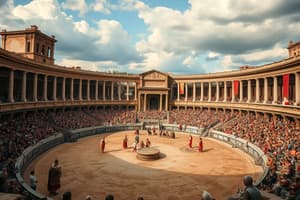Podcast
Questions and Answers
What marked the beginning of the Roman Republic?
What marked the beginning of the Roman Republic?
- Assassination of Julius Caesar
- Defeat of the Carthaginians
- Overthrow of the Etruscan King (correct)
- Founding of Rome by Romulus
In what century did the ancestors of the Romans live in huts on the Palatine Hill?
In what century did the ancestors of the Romans live in huts on the Palatine Hill?
- Tenth century BCE (correct)
- Eighth century BCE
- Fifth century BCE
- Sixth century BCE
Who was the first king of Rome?
Who was the first king of Rome?
- Mark Antony
- Romulus (correct)
- Julius Caesar
- Pompey
What was one of the factors that played a vital role in Roman expansion?
What was one of the factors that played a vital role in Roman expansion?
What was the result of the wars fought between Rome and Carthage?
What was the result of the wars fought between Rome and Carthage?
Who was assassinated in 44 BCE by Romans who felt he was becoming too much like a king?
Who was assassinated in 44 BCE by Romans who felt he was becoming too much like a king?
Who ruled Rome for 41 years until his death in 14 CE?
Who ruled Rome for 41 years until his death in 14 CE?
What was the name given to the series of wars fought between Rome and Carthage?
What was the name given to the series of wars fought between Rome and Carthage?
What is the approximate distance between the south-west tip of Sicily and the coast of Africa?
What is the approximate distance between the south-west tip of Sicily and the coast of Africa?
What percentage of the Roman aqueduct system was above ground?
What percentage of the Roman aqueduct system was above ground?
What was the primary purpose of the Cloaca Maxima?
What was the primary purpose of the Cloaca Maxima?
Which social class in Rome was comprised of those who could trace their origins back to nobility?
Which social class in Rome was comprised of those who could trace their origins back to nobility?
What was the primary source of wealth for the equites?
What was the primary source of wealth for the equites?
What was the term of office for a Roman consul?
What was the term of office for a Roman consul?
What was the primary function of the Roman consuls?
What was the primary function of the Roman consuls?
What was the purpose of having two consuls in Rome?
What was the purpose of having two consuls in Rome?
Flashcards are hidden until you start studying
Study Notes
Rome's Early History
- Rome began as a small village in central Italy in the 6th century BCE and expanded to a vast empire by 200 CE.
- Romulus was Rome's first king, ruling in 753 BCE.
- The ancestors of the Romans lived on the Palatine Hill in the 10th century BCE, near the Tiber River.
Etruscan Influence and the Roman Republic
- The Etruscans, a civilization north of Rome, influenced Roman development, introducing the written script and architectural features like the arch.
- Rome was ruled by Etruscan kings until the Romans defeated them in 509 BCE, marking the beginning of the Roman Republic.
Expansion and Military Superiority
- It took Rome around 200 years to control Italy, thanks to military superiority and a policy of granting citizenship to conquered peoples.
- Rome fought the Punic Wars with Carthage from 264 to 146 BCE for control of Sicily.
- Julius Caesar was assassinated in 44 BCE, and Octavian (later Augustus) ruled Rome from 27 BCE to 14 CE.
Infrastructure and Engineering
- Rome's strategic location in central Italy and control of Sicily allowed it to dominate the Mediterranean region.
- By 200 CE, Rome had 11 aqueducts bringing water into the city, with arches above ground and clay-lined pipes underground.
- The water supply system served public baths, fountains, and villas, with wastewater drained into the Tiber River through the Cloaca Maxima.
Social Classes and Government
- Roman society consisted of patricians (nobility), plebeians (landowners and laborers), equites (wealthy merchants and tax collectors), and proletariat (landless laborers).
- Consuls, the leaders of Rome, were elected for one-year terms and held significant powers, but were limited by their short tenure and dual consular system.
- Praetors, lower-ranking magistrates, assisted the consuls in governing Rome.
Studying That Suits You
Use AI to generate personalized quizzes and flashcards to suit your learning preferences.





